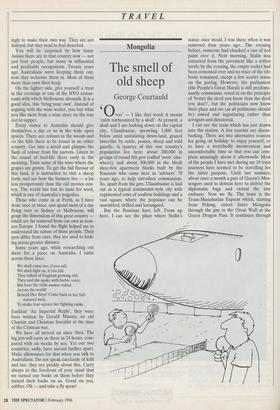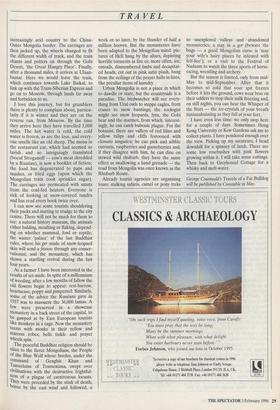Mongolia
The smell of old sheep
George Courtauld
voo' — I like that word: it means `cairn surmounted by a skull'. At present, a skull and I are looking down on the capital city, Ulaanbaatar, sprawling 1,000 feet below amid undulating down-land, grazed lawn-like by cattle, ponies, sheep and wild gazelle. A quarter of this vast country's population live here: about 200,000 in groups of round felt gers (called `yurts' else- where), and about 300,000 in the bleak shoe-box apartment blocks built by the Russians who came here as 'advisers' 70 years ago, to help introduce communism. So, apart from the gers, Ulaanbaatar is laid out as a typical communist-style city with regimented rows of soulless buildings and a vast square where the populace can be assembled, drilled and harangued.
But the Russians have left. From up here, I can see the place where Stalin's statue once stood. I was there when it was removed four years ago. The evening before, someone had chucked a can of red paint over it. Next morning, Stalin was extracted from the pavement like a rotten tooth; by the evening, the empty socket had been cemented over and no trace of the vile brute remained, except a few scarlet stains on the paving. However, the parliament (the People's Great Hural) is still predomi- nantly communist, voted in on the principle of 'better the devil you know than the devil you don't', but the politicians now know their place and are (as all politicians should be) cowed and ingratiating rather than arrogant and dictatorial.
I can see the train which has just drawn into the station. A few tourists are disem- barking. There are two alternative reasons for going on holiday: to enjoy yourself, or to have a wretchedly inconvenient and uncomfortable time so that you can com- plain amusingly about it afterwards. Most of the people I have met during my 18 train journeys here seemed to be travelling for the latter purpose. Until last summer, about once a month a pair of Queen's Mes- sengers used to detrain here to deliver the diplomatic bags and victual the tiny embassy. Now we fly. The train is the Trans-Manchurian Express which, starting from Peking, enters Inner Mongolia through the gap in the Great Wall at the Green Dragon Pass. It continues through increasingly arid country to the China- Outer Mongolia border. The carriages are then jacked up, the wheels changed to fit the different width of track, and the train shunts and potters on through the Gobi Desert, 'the Great Hungry Place'. Finally, after a thousand miles, it arrives at Ulaan- baatar. Here we would leave the train, which continues towards Lake Baikal, to link up with the Trans-Siberian Express and go on to Moscow, through lands far away and forbidden to us.
I love this journey, but for grumblers there is plenty to complain about, particu- larly if it is winter and they are on the reverse run, from Moscow. By the time they arrive here they have travelled 5,000 miles. The hot water is cold, the cold water is frozen, as are the loos, and every- one smells like an old sheep. The menu in the restaurant car, which had seemed so lavish and so intriguingly translated (boeuf Stroganoff — cow's meat shredded by a Russian), is now a booklet of fiction; the food has degenerated to paps and mushes, or fried eggs (upon which the Mongolian train cook sprinkles sugar). The carriages are permeated with smuts from the coal-fed heaters. Everyone is sick of looking at snow-covered tundra and has read every book twice over.
I can now see some tourists shouldering their packs and starting to trudge to the city centre. There will not be much for them to see: a natural history museum, the animals either balding, moulting or flaking, depend- ing on whether mammal, fowl or reptile; the winter 'palace' of the last Buddhist ruler, where his ger made of snow-leopard skin will send a frisson through any conser- vationist; and the monastery, which has shown a startling revival during the last four years.
As a farmer I have been interested in the results of set-aside. In spite of a millennium of weeding, after a few months of fallow the old flowers begin to appear: rest-harrow, heartsease, poppy and pimpernel. Similarly, some of the advice the Russians gave in 1937 was to massacre the 36,000 lamas. A few were preserved in a showcase monastery in a back street of the capital, to be gawped at by East European tourists like monkeys in a cage. Now the monastery teems with monks in their yellow and maroon robes, bells tinkle and prayer wheels spin. The peaceful Buddhist religion should be alien to the fierce Mongolians, the People of the Blue Wolf whose hordes, under the command of Genghis Khan and Tamurlaine of Transoxiana, swept over civilisations with the destructive frightful- ness of a plague of carnivorous locusts. They were preceded by the stink of death, borne by the east wind and followed, a week or so later, by the thunder of half a million hooves. But the monasteries have been adapted to the Mongolian mind: pic- tures of Hell hang by the altars, depicting horrific torments in fire or, more often, ice; entrails, dismembered limbs and decapitat- ed heads, cut out in pink satin plush, hang from the ceilings of the prayer halls in lines, like peculiar items of laundry.
Urban Mongolia is not a place in which to dawdle or stare, but the countryside is a paradise. The birdwatcher will see every- thing from Ural owls to steppe eagles, from cranes to snow buntings; the zoologist might see snow leopards, lynx, the Gobi bear and the marmot, from which, interest- ingly, he can catch bubonic plague. For the botanist, there are valleys of red lilies and yellow tulips and cliffs festooned with clematis tangutica; he can pick and nibble currants, raspberries and gooseberries and, if they disagree with him, he can dine on stewed wild rhubarb, they have the same effect as swallowing a hand grenade — the road from Mongolia was once known as the Rhubarb Route.
Already tourist agencies are organising tours: stalking safaris, camel or pony treks to unexplored valleys and abandoned monasteries; a stay in a ger (beware the bugs — a good Mongolian curse is 'may your wife's hairy places be infested with felt-lice'); or a visit to the Festival of Nadaam to watch the three sports of horse- racing, wrestling and archery.
But the season is limited, only from mid- May to mid-September. After that it becomes so cold that your spit freezes before it hits the ground, cows wear bras on their udders to stop their milk freezing and, on still nights, you can hear the Whisper of the Stars — the ice-crystals of your breath tintinnabulating as they fall at your feet.
I have even less time: we only stop here for a couple of days. Sometimes Hong Kong University or Kew Gardens ask me to collect plants. I have pondered enough over the view. Picking up my secateurs, I head downhill for a spinney of larch. There are some low rosebushes with pink flowers growing within it. I will take some cuttings. Then back to Greyhound Cottage for a whisky and melt-water.
George Courtauld's Travels of a Fat Bulldog will be published by Constable in May.



































































 Previous page
Previous page